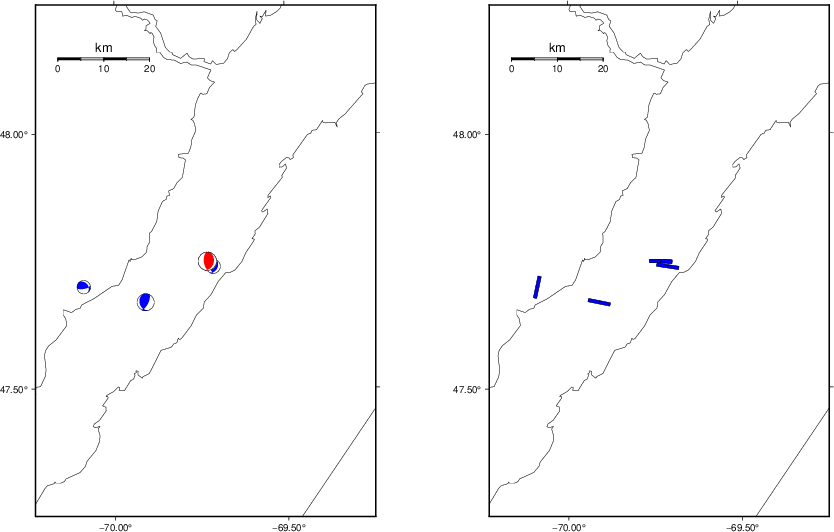
The ANSS event ID is usp000dhn5 and the event page is at https://earthquake.usgs.gov/earthquakes/eventpage/usp000dhn5/executive.
2005/03/06 06:17:49 47.750 -69.730 13.3 4.9 Quebec, Canada
USGS/SLU Moment Tensor Solution
ENS 2005/03/06 06:17:49:0 47.75 -69.73 13.3 4.9 Quebec, Canada
Stations used:
CN.A11 CN.A54 CN.A61 CN.A64 CN.ALFO CN.ALGO CN.BANO CN.CBRQ
CN.GAC CN.GGN CN.ICQ CN.KGNO CN.LMN CN.LMQ CN.MNT CN.MRHQ
CN.PEMO CN.PLVO CN.VLDQ US.NCB
Filtering commands used:
cut o DIST/3.3 -40 o DIST/3.3 +50
rtr
taper w 0.1
hp c 0.03 n 3
lp c 0.10 n 3
Best Fitting Double Couple
Mo = 9.02e+22 dyne-cm
Mw = 4.57
Z = 13 km
Plane Strike Dip Rake
NP1 175 60 80
NP2 14 31 107
Principal Axes:
Axis Value Plunge Azimuth
T 9.02e+22 73 60
N 0.00e+00 9 180
P -9.02e+22 14 272
Moment Tensor: (dyne-cm)
Component Value
Mxx 1.77e+21
Mxy 6.68e+21
Mxz 1.17e+22
Myy -7.87e+22
Myz 4.35e+22
Mzz 7.69e+22
----#########-
-------############---
---------###############----
---------#################----
----------###################-----
-----------####################-----
------------#####################-----
------------######################------
------------########### #########-----
-- --------########### T #########------
-- P --------########### #########------
-- --------######################-------
--------------#####################-------
-------------#####################------
-------------####################-------
-------------##################-------
-------------################-------
------------###############-------
-----------############-------
-----------#########--------
----------####--------
------#-------
Global CMT Convention Moment Tensor:
R T P
7.69e+22 1.17e+22 -4.35e+22
1.17e+22 1.77e+21 -6.68e+21
-4.35e+22 -6.68e+21 -7.87e+22
Details of the solution is found at
http://www.eas.slu.edu/eqc/eqc_mt/MECH.NA/20050306061749/index.html
|
STK = 175
DIP = 60
RAKE = 80
MW = 4.57
HS = 13.0
The NDK file is 20050306061749.ndk The waveform inversion is preferred.
The following compares this source inversion to those provided by others. The purpose is to look for major differences and also to note slight differences that might be inherent to the processing procedure. For completeness the USGS/SLU solution is repeated from above.
USGS/SLU Moment Tensor Solution
ENS 2005/03/06 06:17:49:0 47.75 -69.73 13.3 4.9 Quebec, Canada
Stations used:
CN.A11 CN.A54 CN.A61 CN.A64 CN.ALFO CN.ALGO CN.BANO CN.CBRQ
CN.GAC CN.GGN CN.ICQ CN.KGNO CN.LMN CN.LMQ CN.MNT CN.MRHQ
CN.PEMO CN.PLVO CN.VLDQ US.NCB
Filtering commands used:
cut o DIST/3.3 -40 o DIST/3.3 +50
rtr
taper w 0.1
hp c 0.03 n 3
lp c 0.10 n 3
Best Fitting Double Couple
Mo = 9.02e+22 dyne-cm
Mw = 4.57
Z = 13 km
Plane Strike Dip Rake
NP1 175 60 80
NP2 14 31 107
Principal Axes:
Axis Value Plunge Azimuth
T 9.02e+22 73 60
N 0.00e+00 9 180
P -9.02e+22 14 272
Moment Tensor: (dyne-cm)
Component Value
Mxx 1.77e+21
Mxy 6.68e+21
Mxz 1.17e+22
Myy -7.87e+22
Myz 4.35e+22
Mzz 7.69e+22
----#########-
-------############---
---------###############----
---------#################----
----------###################-----
-----------####################-----
------------#####################-----
------------######################------
------------########### #########-----
-- --------########### T #########------
-- P --------########### #########------
-- --------######################-------
--------------#####################-------
-------------#####################------
-------------####################-------
-------------##################-------
-------------################-------
------------###############-------
-----------############-------
-----------#########--------
----------####--------
------#-------
Global CMT Convention Moment Tensor:
R T P
7.69e+22 1.17e+22 -4.35e+22
1.17e+22 1.77e+21 -6.68e+21
-4.35e+22 -6.68e+21 -7.87e+22
Details of the solution is found at
http://www.eas.slu.edu/eqc/eqc_mt/MECH.NA/20050306061749/index.html
|
A preliminary LCSN moment tensor solution for the event on 03/06/2005
at 06:17:49 UTC located at 17 km SW of Riviere-du-Loup, QC, Canada.
Location: 47.76N 69.69W, h=15 km, LCSN
A moderate earthquake occurred in the Charlevoix seismic zone in
Quebec, Canada. Moment magnitude, Mw 4.7, and focal depth of 15 km
were obtained from analysis of long period waves recorded by 21
stations of the Canadian National Seismic Network (CNSN),
Lamont-Doherty Cooperative Seismographic Network (LCSN) and U.S.
National Seismic Network (USNSN) stations in the region.
Best Fitting Double-Couple:
Mo = 1.09 (+/-0.42) 10^23 Dyne-cm, (1.09 e+16 Nm)
Mw = 4.7
h = 15 km
Plane Strike Dip Rake
NP1 5 38 106
NP2 165 54 78
Principal Axes:
Axis Azimuth Plunge Value
P 264 8 -0.10E+24
N 172 10 -0.34E+20
T 32 77 0.10E+24
LCSN Moment Tensor Solution
Event Date/Time:03/06/2005 06:17:49 (Preliminary)
Moment Tensor: Scale = 10**23 Dyne-cm
Component Value
Mxx= 0.022 Mxy=-0.086 Mxz= 0.196
Myy=-0.955 Myz= 0.251 Mzz= 0.933
-########---
---############-----
-----##############-----
------################------
-------##################-------
--------###################-------
---------####################-------
---------######################-------
---------######################-------
----------########## #########--------
-----------######### T #########--------
-----------######### #########--------
--------#####################--------
P ---------####################--------
---------####################--------
------------##################--------
------------##################--------
------------################--------
------------##############--------
------------############--------
------------#########-------
-----------## #-------
----------- N ------
------# #-
|
 |
The focal mechanism was determined using broadband seismic waveforms. The location of the event (star) and the stations used for (red) the waveform inversion are shown in the next figure.
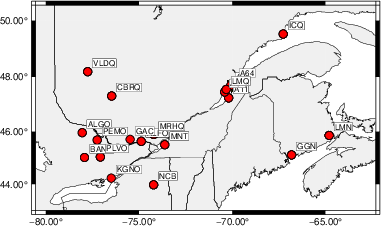
|
|
|
The program wvfgrd96 was used with good traces observed at short distance to determine the focal mechanism, depth and seismic moment. This technique requires a high quality signal and well determined velocity model for the Green's functions. To the extent that these are the quality data, this type of mechanism should be preferred over the radiation pattern technique which requires the separate step of defining the pressure and tension quadrants and the correct strike.
The observed and predicted traces are filtered using the following gsac commands:
cut o DIST/3.3 -40 o DIST/3.3 +50 rtr taper w 0.1 hp c 0.03 n 3 lp c 0.10 n 3The results of this grid search are as follow:
DEPTH STK DIP RAKE MW FIT
WVFGRD96 1.0 175 65 -90 4.46 0.5455
WVFGRD96 2.0 170 60 -85 4.48 0.5048
WVFGRD96 3.0 170 80 70 4.46 0.4960
WVFGRD96 4.0 175 75 75 4.46 0.5598
WVFGRD96 5.0 180 75 80 4.46 0.6136
WVFGRD96 6.0 180 70 80 4.47 0.6597
WVFGRD96 7.0 175 70 80 4.47 0.6997
WVFGRD96 8.0 175 65 80 4.50 0.7307
WVFGRD96 9.0 175 65 80 4.50 0.7556
WVFGRD96 10.0 175 65 80 4.54 0.7723
WVFGRD96 11.0 170 65 80 4.54 0.7821
WVFGRD96 12.0 175 60 80 4.57 0.7904
WVFGRD96 13.0 175 60 80 4.57 0.7910
WVFGRD96 14.0 170 60 80 4.57 0.7832
WVFGRD96 15.0 175 55 80 4.59 0.7747
WVFGRD96 16.0 180 55 80 4.60 0.7621
WVFGRD96 17.0 185 50 80 4.63 0.7465
WVFGRD96 18.0 190 50 85 4.64 0.7338
WVFGRD96 19.0 20 45 90 4.67 0.7211
WVFGRD96 20.0 205 45 95 4.70 0.7044
WVFGRD96 21.0 15 45 85 4.70 0.6949
WVFGRD96 22.0 20 50 85 4.72 0.6847
WVFGRD96 23.0 20 50 85 4.73 0.6752
WVFGRD96 24.0 20 50 85 4.73 0.6646
WVFGRD96 25.0 15 50 80 4.73 0.6500
WVFGRD96 26.0 15 50 80 4.74 0.6377
WVFGRD96 27.0 10 50 75 4.74 0.6203
WVFGRD96 28.0 15 55 80 4.75 0.6079
WVFGRD96 29.0 15 55 80 4.76 0.5959
The best solution is
WVFGRD96 13.0 175 60 80 4.57 0.7910
The mechanism corresponding to the best fit is
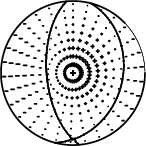
|
|
|
The best fit as a function of depth is given in the following figure:
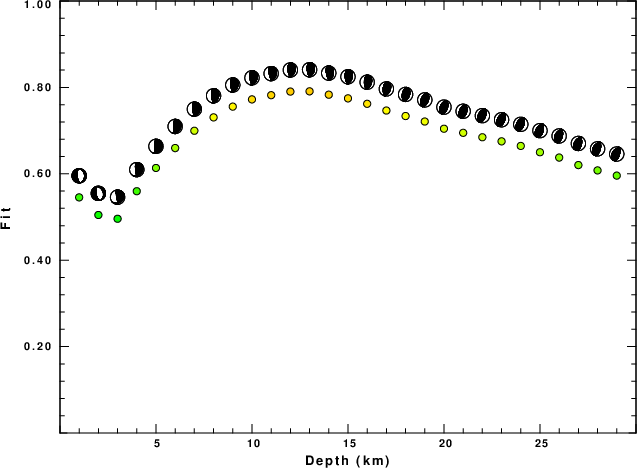
|
|
|
The comparison of the observed and predicted waveforms is given in the next figure. The red traces are the observed and the blue are the predicted. Each observed-predicted component is plotted to the same scale and peak amplitudes are indicated by the numbers to the left of each trace. A pair of numbers is given in black at the right of each predicted traces. The upper number it the time shift required for maximum correlation between the observed and predicted traces. This time shift is required because the synthetics are not computed at exactly the same distance as the observed, the velocity model used in the predictions may not be perfect and the epicentral parameters may be be off. A positive time shift indicates that the prediction is too fast and should be delayed to match the observed trace (shift to the right in this figure). A negative value indicates that the prediction is too slow. The lower number gives the percentage of variance reduction to characterize the individual goodness of fit (100% indicates a perfect fit).
The bandpass filter used in the processing and for the display was
cut o DIST/3.3 -40 o DIST/3.3 +50 rtr taper w 0.1 hp c 0.03 n 3 lp c 0.10 n 3
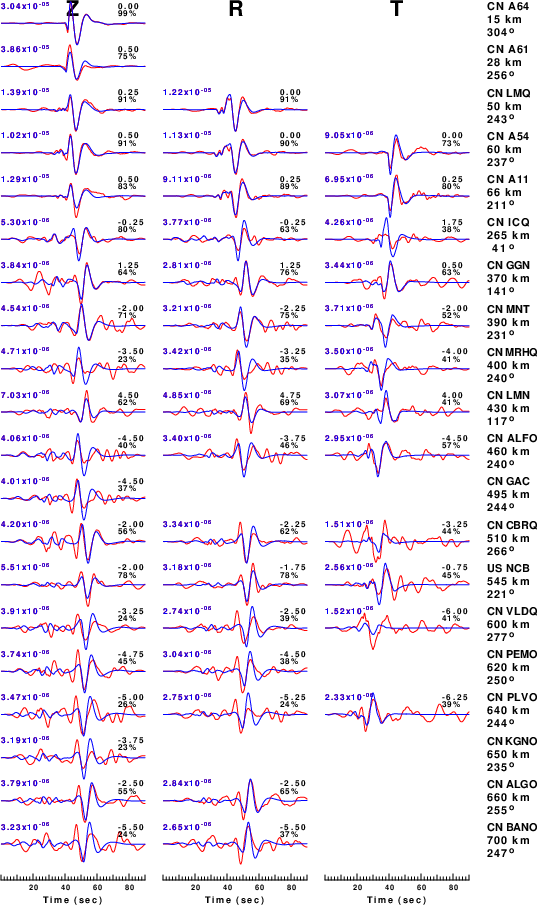
|
| Figure 3. Waveform comparison for selected depth. Red: observed; Blue - predicted. The time shift with respect to the model prediction is indicated. The percent of fit is also indicated. The time scale is relative to the first trace sample. |
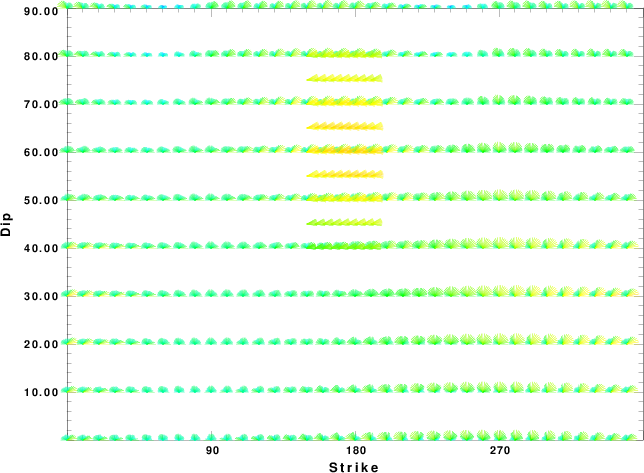
|
| Focal mechanism sensitivity at the preferred depth. The red color indicates a very good fit to the waveforms. Each solution is plotted as a vector at a given value of strike and dip with the angle of the vector representing the rake angle, measured, with respect to the upward vertical (N) in the figure. |
A check on the assumed source location is possible by looking at the time shifts between the observed and predicted traces. The time shifts for waveform matching arise for several reasons:
Time_shift = A + B cos Azimuth + C Sin Azimuth
The time shifts for this inversion lead to the next figure:
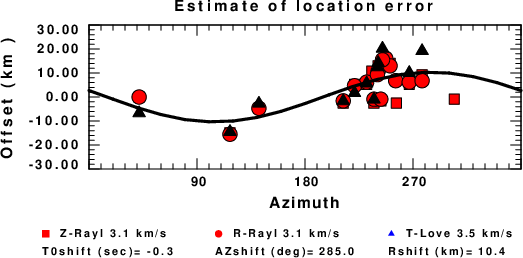
The derived shift in origin time and epicentral coordinates are given at the bottom of the figure.
The CUS.model used for the waveform synthetic seismograms and for the surface wave eigenfunctions and dispersion is as follows (The format is in the model96 format of Computer Programs in Seismology).
MODEL.01 CUS Model with Q from simple gamma values ISOTROPIC KGS FLAT EARTH 1-D CONSTANT VELOCITY LINE08 LINE09 LINE10 LINE11 H(KM) VP(KM/S) VS(KM/S) RHO(GM/CC) QP QS ETAP ETAS FREFP FREFS 1.0000 5.0000 2.8900 2.5000 0.172E-02 0.387E-02 0.00 0.00 1.00 1.00 9.0000 6.1000 3.5200 2.7300 0.160E-02 0.363E-02 0.00 0.00 1.00 1.00 10.0000 6.4000 3.7000 2.8200 0.149E-02 0.336E-02 0.00 0.00 1.00 1.00 20.0000 6.7000 3.8700 2.9020 0.000E-04 0.000E-04 0.00 0.00 1.00 1.00 0.0000 8.1500 4.7000 3.3640 0.194E-02 0.431E-02 0.00 0.00 1.00 1.00